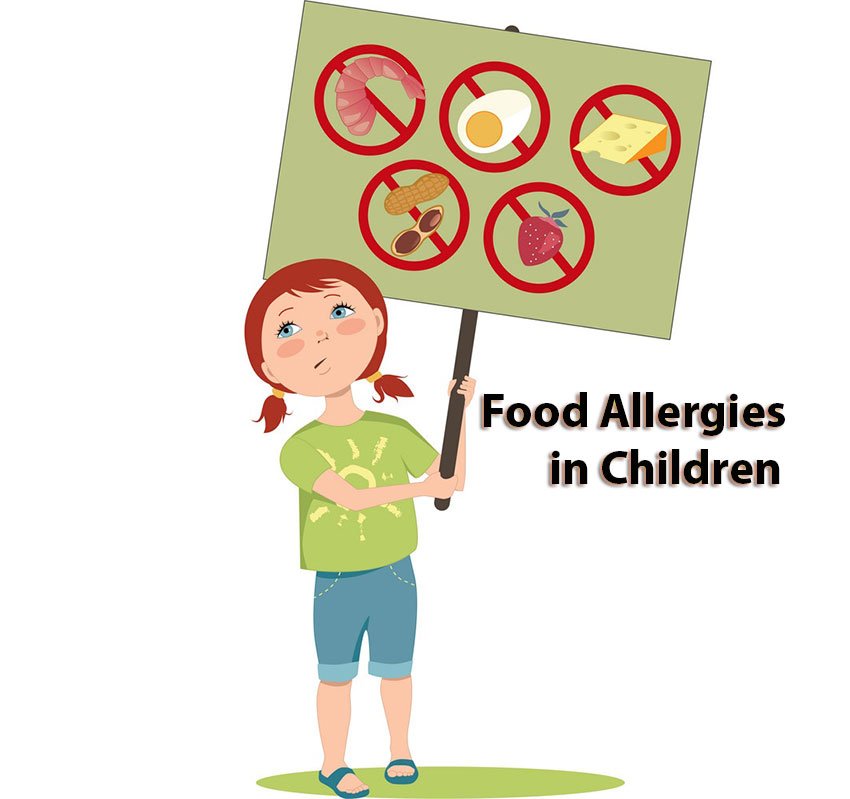Statistics on Food Allergies in children:
Food Allergy is an undesirable response produced by the immune system of our body, and these responses may be destructive, painful, itchy, or occasionally fatal for our health. Generally, food allergies can develop at any age but are most common in less than 5 years of age. In the United States study shown that every 1 out of 13 children (under 18 year) affected by food allergies every year. Center for Disease Control and Prevention report says, Food allergies in children rapidly increased by approximately 50% in the last two decades in the United States and also in developing countries.
The number of allergic people is increasing day by day, and there is no clear answer yet, why food allergies are rapidly growing in developing counties worldwide. As estimate every year $25 billion economic costs spend over children food allergies in the world. According to the FDA, up to 6% of children age under 3 are affected by food allergies in the United States.
Common foods may cause food allergies in children:
According to researches, generally, eight foods are caused above 90% food allergies in children in the last two decades. These foods are here below.
- Milk
- Egg
- Soy
- Peanut
- Wheat
- Fish
- Tree nuts
- Shellfish
Milk allergy in infant and children:
Milk allergy is most common in infant and children; it may develop in the early days of childhood. Normally the reaction of milk allergy is mild like abdominal pain, but it can be severe in some cases such as anaphylaxis. An infant who is breastfed has a lower risk of food allergy as compared to those who are formula fed. Most of the time, milk allergy goes away by the time a child is 5 year old. If you have in doubt regarding your children is allergic to milk, immediately consult your doctor. The best way to prevent the milk allergy is to avoid milk and milk product.
Symptoms of milk allergy:
Milk allergy is the most common food allergy in infant and young children when the human body immune system behaves adverse reaction to milk and product containing milk. Symptoms of milk allergy will generally appear in the early month of a baby. Allergic reaction with milk normally arises minute to an hour after consuming the milk or any milk product. Signs of an allergic reaction range from minor to severe, symptoms may be including.
- Vomiting
- Refusing food
- Skin rashes
- Colic
- Gastric distress such as stomach pain
- Wheeze
- Diarrhea or anaphylactic reaction
One thing is to remember, do not confuse lactose intolerance with a food allergy, lactose intolerance do not involve with the immune system of our body. Lactose intolerance patients are incapable of digests food, it can cause discomfort, but it is not life-threating for the patient.
Egg allergy in infant and children:
Eggs are the healthiest food on earth but not for someone who is allergic to eggs and eggs relating foods. Eggs are also one of the most common food causing allergies in children; they may develop an early age of children’s. It can develop when our immune system sensitized and behaves adverse response to protein in egg yolk or egg white. Research has shown in a recent year every 2 children out of 100 are affected with egg allergy in the United States; happily, 70 % children with an egg allergy will outgrow the condition by age 16 or above.
Symptoms of egg allergy:
Symptoms of egg allergy normally occur soon as eating egg or egg foods. An allergic reaction of egg white or egg yolk or egg foods are rang mild or severe; it depends on the intensity of the allergic reaction in our body’s immune system. Egg allergic reaction may be disturbing these body systems.
Gastrointestinal (Digestive system):
Vomiting, Nausea, Cramps, Constipation, Stomach pain, Esophagitis, and Diarrhea.
Skin:
Swelling and redness on the external part of body, eczema, itchy (hives), and swelling on lips and tongue (skin reactions are the most common in food allergic reactions).
Cardiovascular:
Fainting (Drop the blood flow in the brain)
Respiratory:
Asthma with wheezing, Coughing, Stuffy nose and Water eyes
Soy allergy in infant and children:
Soy is vegetable food and using throw-out of the world for food purpose. Soy is in the legume family (beans, peas, peanut, and lentils); it is also one of the common cause of allergy in young children because of soy-beans based infant formula. Some are allergic from one type of legume, and other is allergic more than one type of soy products. According to the US food and drug administration, soy proteins are one of the major cause for the allergies in children. Some clinical experience suggested that soy allergic reaction should be higher in infant and children than among adults.
Symptoms of soy allergy:
When infant or children take any soy protein than the immune system of body fight against infections and overreacted to soy protein. Causes an allergic reaction and released the chemical ‘histamine’ which can cause in infant or children to have these type of symptoms below.
Skin:
Swelling and redness on the external part of body, eczema, itchy (hives), and swelling on lips and tongue (skin reactions are the most common in food allergic reactions).
Gastrointestinal (Digestive system):
Constipation, Stomach pain, Vomiting, Nausea, Cramps, Esophagitis, and Diarrhea.
Respiratory:
Asthma with wheezing and coughing, stuffy nose and water eyes
Cardiovascular:
Fainting (Drop the blood flow in the brain) and drop of blood pressure in the body.
Peanut allergy in infant and children:
Peanut is also one of the types of the legume family. The cause of peanut allergy in infants and children is peanut base food formula available in the market, and four out of 100 children are affected by food allergy in the United States. Peanut allergy some time causes a fatal reaction, so when someone suffers peanut allergy reaction needs immediate medical attention for the right treatment.
Symptoms of peanut allergy:
When an allergic person immune system release histamine that can affect a person’s lungs, cardiovascular, skin, and digestive system. As early we discussed that who suffer from peanut-allergic reaction needs immediate medical treatment. As we have to know about the symptoms of peanut allergy for a better cure for our healthy life, so here are some signs are listed of peanut-allergic reaction.
Mild Symptoms:
- Runny nose
- Vomiting and stomach cramps
- Itching
- Skin reaction like redness of the external part of the body
- Severe symptoms:
- Speedy pulse
- A shocking drop in blood pressure
- Dizziness
- Swelling of the throat that makes trying to breath
Treatment of food allergies:
You must know the reaction is mild or severe.
Food allergies are more common in those children where the family history suffer from allergy. Infants are more at risk with food allergies affected by eczema. The best treatment of food allergies is avoiding those foods to use in the diet of an allergic patient. If you see any mild signs or symptoms regarding food allergy in your children, you should go to your doctor when the allergic reaction is occurring.
Common food allergies in a different part of the world:
- Milk and Eggs: Worldwide
- Mustard seeds: France
- Peanut & Nuts: USA, UK & Australia
- Shellfish: Italy and Spain
- Fish: Spain and Japan












One thought on “Most Common Food allergies in Children”
Comments are closed.